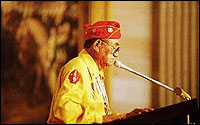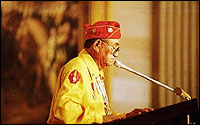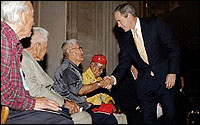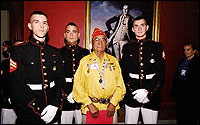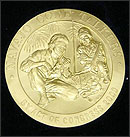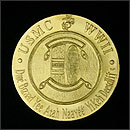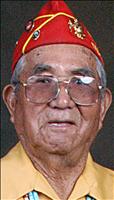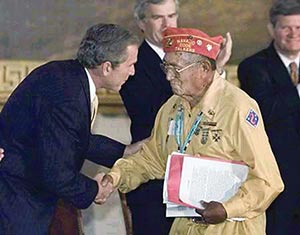WINDOW ROCK — John Brown Jr., 88, one of the original 29 U.S.M.C. WWII Code Talkers and a former Navajo Tribal councilman, died Wednesday morning.
Flags have been ordered to be flown at half-staff by President Joe Shirley beginning Thursday in Brown's honor.
A community meeting is scheduled Thursday at 6:30 at the Crystal Chapter House, the president's office stated. Funeral arrangements are pending.
"Today, with sadness, we heard of the passing of Mr. John Brown Jr., one of the original 29 Navajo Code Talkers and one of the Navajo Nation's great warriors," Shirley said. "For so long, these brave men were the true unsung heroes of World War II, shielding their valiant accomplishments not only from the world but from their own families.
The recognition and acknowledgment of their great feats came to them late in life but, for most, not too late. These heroes among us are now a very precious few, and we, as a nation, mourn their loss. We offer our deepest condolences to the family of Mr. John Brown Jr."
Brown was born Dec. 24, 1921, in Chinle, near Canyon de Chelly to the late Nonabah Begay and the late John Brown. His mother died two years ago at the age of 102.
Brown attended Chinle Boarding School and graduated in 1940 from Albuquerque Indian School. He was playing basketball when he heard about the bombing at Pearl Harbor, said his son Frank Brown.
"Sometime after that he remembered a number of Marine recruiters started talking to the young Navajo boys," Frank Brown said. Brown ended up going to Fort Wingate to the military installation.
His father remembered being signed up, sworn in and given his physical right then and there, Frank Brown said. Brown was immediately sent to Camp Pendleton for basic training.
"They weren't allowed to go home to say goodbye to their family or write letters," Frank Brown said.
"At some phase in their basic training, they were taken into one big room and a commandant told them they were all there for a special reason, and they were to devise a code in their language," Frank Brown said. "The boys were left there in the room and they didn't know what the heck to do. But they devised the code using names of animals and mammals to describe what would go with the alphabet."
That code consisted of translations for 211 English words and was later expanded to 411 words, according to the president's office. The code also included Navajo equivalents for the letters in the English alphabets so the Code Talkers could spell out names and locations. The code and the Code Talkers would help end World War II.
Navajo Code Talkers participated in battles in the Pacific from 1942 to 1945. Frank Brown said his father served in four major battles at Tarawa, Saipan, Tinian and Guadalcanal. The code was not declassified until 1968.
Brown was one of the original 29 Code Talkers presented with the Congressional Gold Medal by President George W. Bush on July 26, 2001 — 56 years following World War II.
At the presentation at the U.S. Capitol Rotunda in Washington, Brown said that it was an honor to be there representing his fellow distinguished Code Talkers.
"I enlisted in the Marine Corps in 1942, not to become a Code Talker — that came later — but to defend the United States of America in the war against the Japanese emperor.
My mother was afraid for my safety, so my grandfather told her to take one of my shoes, place an arrowhead in it, take it to the mountain called Two Little Hills, and go there every day to pray that I would remain safe. Maybe she was more successful than she imagined because the Marine Corps soon had the Navajo Marines develop a secret code using our language. My comrade and I volunteered to become Navajo radio operators, or Code Talkers," Brown said at the presentation.
"Our precious and sacred Navajo language was bestowed upon us, not a nation, but a holy people. Our language is older than the Constitution of the United States. I'm proud that, at this point in American history, our native language and the code will developed came to the aid of our country, saving American lives and helping the other U.S. armed forces ultimately to defeat the enemies.
"After the original 29 Code Talkers, there are just five of us that live today: Chester Nez, Lloyd Oliver, Allen Dale June, Joe Palmer and myself. We have seen much in our lives. We have experienced war and peace. We know the value of freedom and democracy that this great nation embodies. But our experience has also shown us how fragile these things can be and how we must stay ever vigilant to protect them, as Code Talkers, as Marines.
"We did our part to protect these values. It is my hope that our young people will carry on this honorable tradition as long as the grass shall grow and water shall flow," Brown said.
President Richard Nixon awarded Navajo Code Talkers a special certificate in appreciation for their patriotism, resourcefulness and courage in 1971. They were included in the Bicentennial Parade in Washington July 4, 1976.
The U. S. Senate passed a bill declaring August 14 National Code Talkers Day in May 1982.
Frank Brown said his father lived a hard life, first training as a welder, then becoming a journeyman and master carpenter and cabinetmaker.
He was one of the veterans who returned to Navajo land and helped to build the Navajo government by serving as a member of the Navajo Tribal Council from 1962 to 1982. He also served three terms as Crystal Chapter president.
"He was always active in politics," Frank Brown said. "He was a wonderful speaker."
Brown began a second career as a traditional counselor for the tribe's Division of Social Services, driving 130 miles to Chinle and back each day.
After that, he went on a lecture tour speaking about the Navajo Code Talkers around the country and becoming active in the Navajo Code Talkers Association, his son said.
"Dad was also a traditional practitioner, constantly learning the traditional way of life but at the same time he was always active in the Mormon Church," Frank Brown said.
Brown is survived by his wife Loncie Polacca Brown and his children Dorothy Whilden, Preston Brown, Everett Brown, Virgil Brown and Frank Brown. His other children were the late Dale Brown and the late Ruth Ann McComb.
WINDOW ROCK — John Brown Jr., 88, one of the original 29 U.S.M.C. WWII Code Talkers and a former Navajo Tribal councilman, died Wednesday morning.
Flags have been ordered to be flown at half-staff by President Joe Shirley beginning Thursday in Brown's honor.
A community meeting is scheduled Thursday at 6:30 at the Crystal Chapter House, the president's office stated. Funeral arrangements are pending.
"Today, with sadness, we heard of the passing of Mr. John Brown Jr., one of the original 29 Navajo Code Talkers and one of the Navajo Nation's great warriors," Shirley said. "For so long, these brave men were the true unsung heroes of World War II, shielding their valiant accomplishments not only from the world but from their own families.
The recognition and acknowledgment of their great feats came to them late in life but, for most, not too late. These heroes among us are now a very precious few, and we, as a nation, mourn their loss. We offer our deepest condolences to the family of Mr. John Brown Jr."
Brown was born Dec. 24, 1921, in Chinle, near Canyon de Chelly to the late Nonabah Begay and the late John Brown. His mother died two years ago at the age of 102.
Brown attended Chinle Boarding School and graduated in 1940 from Albuquerque Indian School. He was playing basketball when he heard about the bombing at Pearl Harbor, said his son Frank Brown.
"Sometime after that he remembered a number of Marine recruiters started talking to the young Navajo boys," Frank Brown said. Brown ended up going to Fort Wingate to the military installation.
His father remembered being signed up, sworn in and given his physical right then and there, Frank Brown said. Brown was immediately sent to Camp Pendleton for basic training.
"They weren't allowed to go home to say goodbye to their family or write letters," Frank Brown said.
"At some phase in their basic training, they were taken into one big room and a commandant told them they were all there for a special reason, and they were to devise a code in their language," Frank Brown said. "The boys were left there in the room and they didn't know what the heck to do. But they devised the code using names of animals and mammals to describe what would go with the alphabet."
That code consisted of translations for 211 English words and was later expanded to 411 words, according to the president's office. The code also included Navajo equivalents for the letters in the English alphabets so the Code Talkers could spell out names and locations. The code and the Code Talkers would help end World War II.
Navajo Code Talkers participated in battles in the Pacific from 1942 to 1945. Frank Brown said his father served in four major battles at Tarawa, Saipan, Tinian and Guadalcanal. The code was not declassified until 1968.
Brown was one of the original 29 Code Talkers presented with the Congressional Gold Medal by President George W. Bush on July 26, 2001 — 56 years following World War II.
At the presentation at the U.S. Capitol Rotunda in Washington, Brown said that it was an honor to be there representing his fellow distinguished Code Talkers.
"I enlisted in the Marine Corps in 1942, not to become a Code Talker — that came later — but to defend the United States of America in the war against the Japanese emperor.
My mother was afraid for my safety, so my grandfather told her to take one of my shoes, place an arrowhead in it, take it to the mountain called Two Little Hills, and go there every day to pray that I would remain safe. Maybe she was more successful than she imagined because the Marine Corps soon had the Navajo Marines develop a secret code using our language. My comrade and I volunteered to become Navajo radio operators, or Code Talkers," Brown said at the presentation.
"Our precious and sacred Navajo language was bestowed upon us, not a nation, but a holy people. Our language is older than the Constitution of the United States. I'm proud that, at this point in American history, our native language and the code will developed came to the aid of our country, saving American lives and helping the other U.S. armed forces ultimately to defeat the enemies.
"After the original 29 Code Talkers, there are just five of us that live today: Chester Nez, Lloyd Oliver, Allen Dale June, Joe Palmer and myself. We have seen much in our lives. We have experienced war and peace. We know the value of freedom and democracy that this great nation embodies. But our experience has also shown us how fragile these things can be and how we must stay ever vigilant to protect them, as Code Talkers, as Marines.
"We did our part to protect these values. It is my hope that our young people will carry on this honorable tradition as long as the grass shall grow and water shall flow," Brown said.
President Richard Nixon awarded Navajo Code Talkers a special certificate in appreciation for their patriotism, resourcefulness and courage in 1971. They were included in the Bicentennial Parade in Washington July 4, 1976.
The U. S. Senate passed a bill declaring August 14 National Code Talkers Day in May 1982.
Frank Brown said his father lived a hard life, first training as a welder, then becoming a journeyman and master carpenter and cabinetmaker.
He was one of the veterans who returned to Navajo land and helped to build the Navajo government by serving as a member of the Navajo Tribal Council from 1962 to 1982. He also served three terms as Crystal Chapter president.
"He was always active in politics," Frank Brown said. "He was a wonderful speaker."
Brown began a second career as a traditional counselor for the tribe's Division of Social Services, driving 130 miles to Chinle and back each day.
After that, he went on a lecture tour speaking about the Navajo Code Talkers around the country and becoming active in the Navajo Code Talkers Association, his son said.
"Dad was also a traditional practitioner, constantly learning the traditional way of life but at the same time he was always active in the Mormon Church," Frank Brown said.
Brown is survived by his wife Loncie Polacca Brown and his children Dorothy Whilden, Preston Brown, Everett Brown, Virgil Brown and Frank Brown. His other children were the late Dale Brown and the late Ruth Ann McComb.
